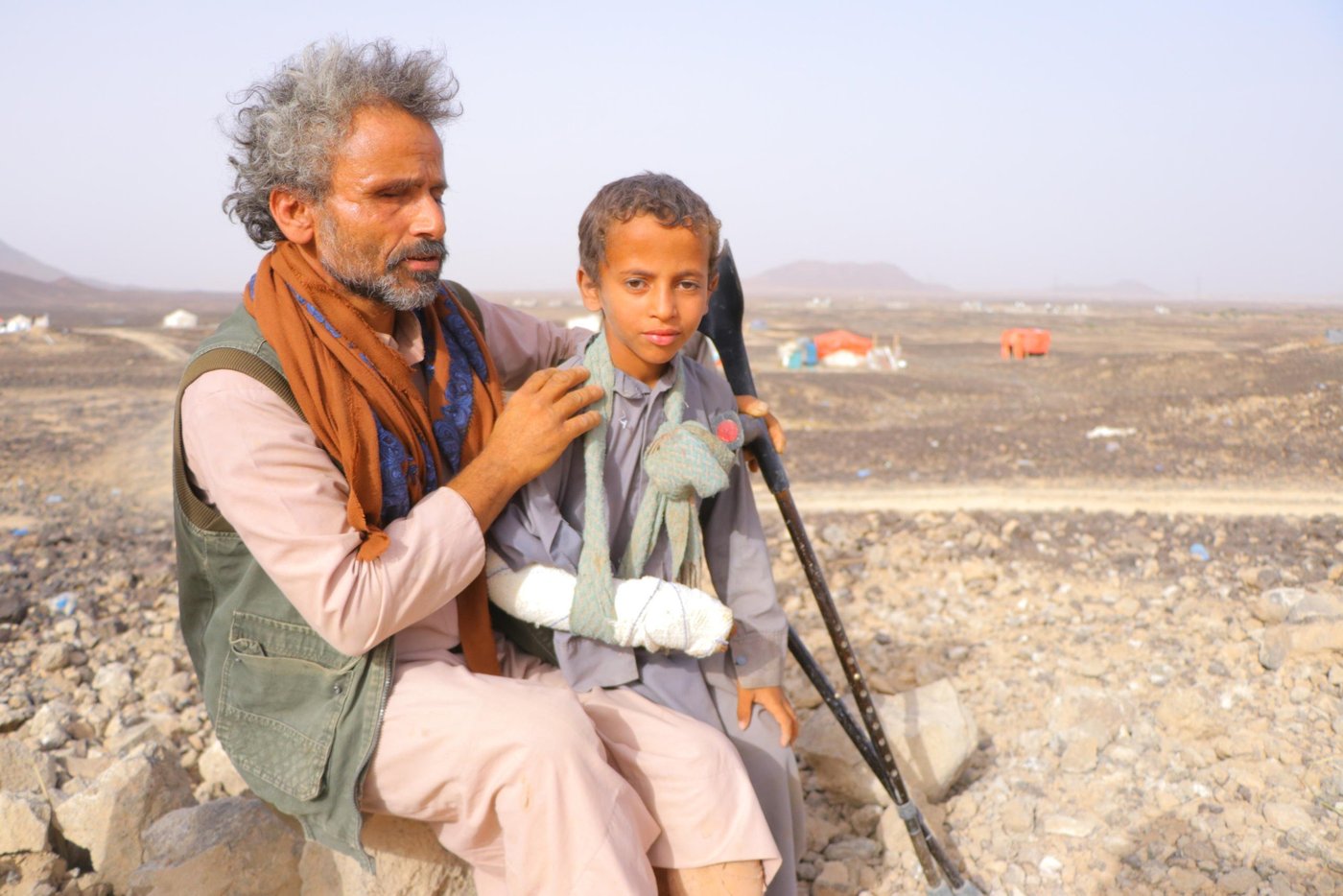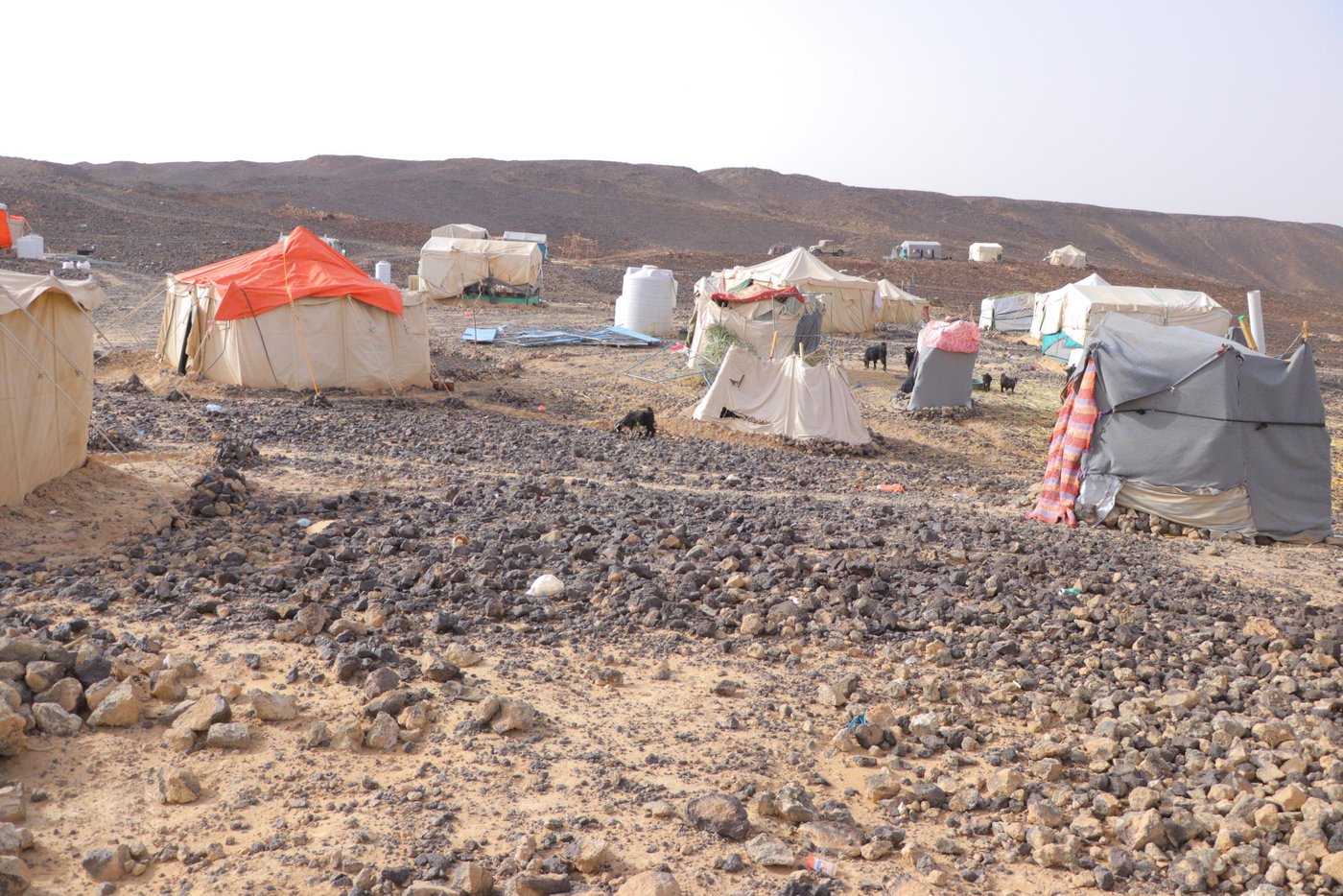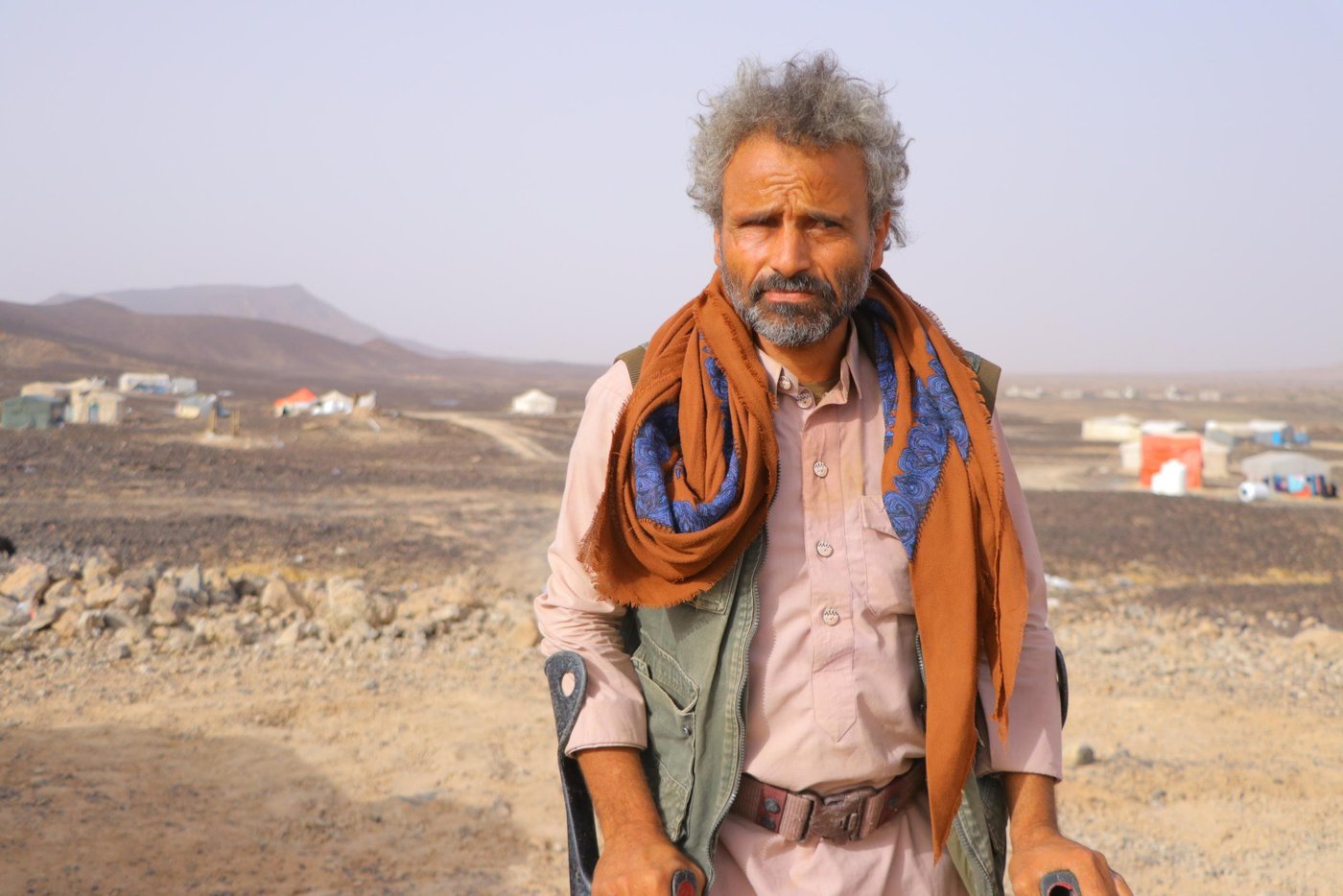In another part of Yemen, two weeks later, Ali Ibrahim was also fleeing for his life. Eight airstrikes fell on his home village in Hajjah governorate one morning.
“My cousin tried to flee the farm with his family,” he told us, “but an airstrike hit them… Three of them were killed, including a baby who was only a few months old. Four others were badly injured.”
Ali and his seven children are now crowded into the tent of another displaced family, in Hajjah’s Abs district – impossible conditions for preventing the spread of Covid-19, which the World Health Organization estimates may infect as many as 55 per cent of Yemeni people.
Ceasefire call ignored
It was not supposed to be like this. Two months ago, on 23 March, the Secretary-General of the United Nations called for a global ceasefire. This call came as Covid-19 cases were surging and was designed to ensure the world could focus on a concerted attempt to combat the rapidly spreading pandemic.
It was a moment of hope. Unfortunately, it has not been heeded.
In Yemen alone, at least 24,000 people like Ali and Muhsen have had to flee fighting since the Secretary-General’s call. Not even a unilateral ceasefire by the Saudi-led coalition on 9 April has stopped the war and its terrible human cost.

Forced into the desert
Muhsen’s home village of Al-Bizah used to be a peaceful one. On the farm inherited from his father, he kept goats and sheep, and planted corn, barley and wheat. He held on to this quiet life through five years of escalating violence. Even when a landmine took both of his legs in 2016, Muhsen steadfastly continued farming, thanks to the help of his children. The farm was his life, and his only source of income. How would his family eat, if they were forced to leave?
But just one day after the unilateral ceasefire was announced, he heard gunfire in the distance. When the gunfire grew closer, he and his family rounded up their animals and struck out for the desert. They ended up in an informal settlement near Marib city, where hundreds of families have gathered over the last four months.

The settlement is known as Al-Swaidah camp, though there is nothing to mark it as such: no running water, no toilets, no electricity. No-one here has been taking any measures against Covid-19, Muhsen says.
“The battles are still ongoing, so we can’t return.”- Muhsen
Muhsen’s family have assembled a tent for themselves from iron pipes and plastic sheets. Food is a constant worry, but Muhsen is just glad to be safe. Families are still arriving from surrounding areas, fleeing the continued fighting. And the news from Muhsen’s hometown is not good. “The battles are still ongoing, so we can’t return.”
Airstrikes continue
Early on 6 May, three weeks after Muhsen’s family fled, airstrikes hit Ali Ibrahim’s extended family on the farm where they lived and worked.
Ali spent most of his life as a farm labourer in his home village of Al-Jar in Hajjah governorate, planting vegetables like tomatoes and onions. On the night of 5 May, he heard warplanes. The bombs fell the next morning. From less than 100 metres away, Ali saw his cousin’s family hit. Three of them were killed.
Other strikes followed. In the ensuing chaos, Ali tried to help. “We saw the deaths in front of us,” he recalls. “I took my children and the injured people to a clinic.” The survivors fled to nearby Al-Shaqaf, with only the clothes they were wearing.
![Despite hearing of other families fleeing, Ali had not thought it would happen to him. But only two weeks ago, early on 6 May, airstrikes hit his extended family on the farm where they worked.
Just like his father before him, Ali Ibrahim had spent most of his life as a farm labourer, in his home village of Al-Jar.
It was hard work but peaceful, planting vegetables like tomatoes, onion and garlic. Most of Ali’s extended family worked alongside him on the same farm. Though his income was only YR1,000 (less than two dollars) a day, it was enough to support his own family of seven children.
“My brothers and I have been working on the farm for 15 years. We built oshas (straw huts) on the farm and we lived there, as we spent most of our time on the farm,” Ali says.
The war first intruded on them in 2015, when the price of fuel doubled, forcing the farmer Ali worked to stop all work for some months. Ali was also aware that families from other areas were fleeing their homes, but didn’t think it would happen to him.
“During the last few months, many families from neighboring areas fled their homes towards Al-Shaqaf village, after battles reached their area. But our area was safe.”
This changed one evening. On Wednesday 6 May, warplanes started to fly over Ali’s village. He and his family didn’t sleep that night, listening to it.
It was morning when the first bombs fell. From less than a hundred metres away, Ali saw his cousin’s hut hit.
“My cousin tried to flee the farm with his family, but an airstrike hit them… Three were killed, including a few-months-old child. And four others were badly injured.”
Other strikes followed. “Eight airstrikes hit the village and the farm in few hours, and almost all residents of the village fled their houses.”
In the ensuing chaos, Ali tried to help the injured. “We saw the deaths in front of us. I took my children and the injured people to Al-Jar clinic.” Then he fled with his family to nearby Al-Shaqaf, with only the clothes they were wearing.
“We didn’t take anything with us as we left on foot. Even the dead bodies we didn’t take. Some brave people returned the second day to bury them…. It would have been death and nothing is better than life.”
Cattle were also hit by the airstrikes. No one dared to stay.
Ali’s children were witnesses to the burnt bodies of their friends and relatives. Some cried, while others were too shocked. They have difficult sleeping now.
“No one can believe what happened for us and we didn’t imagine it before. I met many displaced families but I wasn’t aware they witnessed such atrocious moments.”
When his family arrived in Al-Shaqaf, they found other displaced families living in tents made of plastic sheets and wood. “As soon as we arrived here, a new journey of suffering started as we don’t have money and we don’t have furniture. But we are lucky that the displaced people [already] here welcomed us.”
Ali’s family now live inside the tent of another family, who fled their house last year. Despite being in dire circumstances themselves, this family shares food, water and everything they have with Ali, who has no money to even buy a plastic sheet to set up a new tent.
“We are in need of everything, but shelter and food is priority as we don’t want to stay in others’ tents for a long time.”
Ali doesn’t know anything about the unilateral ceasefire, nor about Covid-19 and what kind of danger it represents for displaced people.
“I’m illiterate man and all I know is that warplanes targeted us and forced us to leave our houses, and we lost our source of incomes in this holy month,” he added.
Ali hopes that he can return his village and resume his work but he feels that is impossible now.
“The best thing was when we would wake up early in the morning and water the vegetables. And after an hour all the farmers would sit together to have their group breakfast in the farm. Those days can’t come again, as some of my relatives and colleague were killed by the airstrikes.”
He wanted to send a message to the whole world about his situation: “There is nothing worse than seeing relatives became burnt bodies and hearing the screaming of children all the time, so try to imagine yourselves in our situation and stop the war on us.”
Photo: Anwar Abdu/NRC](/cdn-cgi/image/width=1400,format=auto,fit=crop,height=788/globalassets/images/countries/yemen/2020/displaced-during-ceasefire/rrm.jpg)
Ali’s family now live in the tent of a family who fled their home last year. Despite being in dire circumstances themselves, this family shares everything they have with Ali, who has no money to buy even a plastic sheet to set up a new tent.
Ali hasn’t heard about the unilateral ceasefire, nor about Covid-19. “I’m an illiterate man and all I know is that warplanes targeted us and forced us to leave our houses,” he told us.
“…try to imagine yourselves in our situation and stop the war on us.”- Ali
“The best thing was when we would wake up early in the morning and water the vegetables. And after an hour all the farmers would sit together to have their group breakfast on the farm. Those days won’t come again. There is nothing worse than seeing relatives become burnt bodies and hearing the screaming of children. So, try to imagine yourselves in our situation and stop the war on us.”
A double disaster
Our staff working in areas close to the conflict frontlines are witnessing people still being forced to flee, at a time when the global health advice is to stay at home. "On a daily basis, displacement is happening,” says Zayed Mohamed Ali, NRC’s Programme Manager in Hodeidah. “And those affected are the civilians."
Over 3.5 million people in Yemen are already displaced because of the country’s brutal five-year war. They are living in a variety of temporary and mostly unsuitable shelters: in camps, damaged houses, or crowded into public buildings. As new cases of Covid-19 spread rapidly across the country, there is a major threat to public health.
The country’s best hope is to stop the fighting and jump-start the stalled peace-talks. So far, the warring parties have failed to grasp this window of opportunity. Since the ceasefire call, attacks on education and healthcare infrastructure – which includes health centres, hospitals, and schools – have doubled. The number of airstrikes in Yemen has increased, and the level of shelling remains high, leading to civilian casualties and damage.
The fighting must stop, and immediately. Otherwise, it is the most vulnerable families, like Ali’s and Muhsen’s, who will be hit the hardest.
***
Yemen is not the only country affected by ongoing conflict. Despite the call for a global ceasefire, a new NRC report has found that conflict and violence displaced an estimated 661,000 people in 19 countries between 23 March and 15 May. Read the main findings here.


